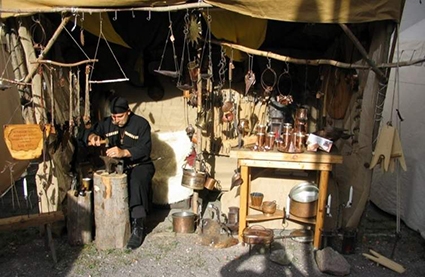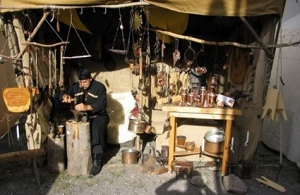From Peacekeeper to Hostage to Coppersmith…
It was a pleasant evening in early autumn in East Germany’s small city of Halle (Saale), when I met with a German man who had spent around 1,500 days in Georgia as a member of UN peacekeeping missions.
Herbert R. Bauer, a middle-aged man with a big moustache and a very characteristic appearance, is a former Sergeant Major of the Federal Armed Forces of Germany who worked as a medical orderly of the United Nations Observation Mission in Georgia (UNOMIG) in the 1990s, when the country was going through a civil war and being in Georgia was no easy task.
Bauer, father of two, served as a soldier in the German Federal Armed Forces for 29 years in Afghanistan and the Caucasus. Since 1994 he has been closely linked with UNOMIG.
Following the dissolution of the Soviet Union in Western Georgia, an armed conflict over Abkhazia began when the Abkhazians declared themselves independent, an independence which Georgia does still not recognize.
The conflict in Abkhazia, a region strategically located on the Black Sea coast in the north-western region of Georgia, began with social strife and attempts by the local authorities to separate from the Republic. It escalated into a series of armed confrontations in the summer of 1992 when the Government of Georgia deployed 2,000 Georgian troops to Abkhazia. Brutal fighting resulted in some 200 dead and hundreds wounded. The Abkhaz leadership abandoned the Abkhaz capital of Sokhumi and retreated to the town of Gudauta.
UNOMIG came in 1993 with 136 military observers from 33 states with a primary mandate to monitor the established security zone between Georgia and Abkhazia and to create the conditions for the safe and orderly return of war refugees. Bauer describes the situation of that time as an easy game for many criminals in Abkhazia.
“The problem was always that Abkhazia couldn’t survive by itself. Everybody was running around with Kalashnikovs and this was considered quite normal. They had three passports. If you saw guy and asked him who he was, he answered that he was a policemen, two days later you met the same person but he was soldier. And Abkhazia had nothing of its own. Even groceries had to be bought from Russia,” Bauer said.
Before arriving in Georgia, Bauer’s knowledge about the country went only as far as it being the birthplace of Soviet leader Josef Stalin. But Pitsunda, a resort town of the breakaway Abkhazia, was his first real impression of Georgia.
“In Pitsunda was a former KGB hotel, very new in style but already heavily damaged. In Sokhumi, we stopped in the hotel Aytar, near the Black Sea beach. It was an incredibly beautiful place,” Bauer remembered.
As a medical orderly in crisis regions one is required not only to keep high standards of competence and team spirit, but also full physical fitness and control in difficult situations.
During his mission in Georgia, in 2003, Bauer was taken hostage when patrolling the Kodori Valley, a buffer zone of Georgia which is now controlled by Abkhaz and Russian separatists.
The kidnapping took place when a patrol of soldiers from the UN’s peacekeeping force and a group of Russian soldiers were on a joint patrol in the Kodori valley, at the time the epicenter of clashes in the Georgian-Abkhazian conflict. The kidnapping was conducted by eight masked and armed men. With Bauer there were two employees of the UN Observers Mission in Georgia (UNOMIG) and one Georgian interpreter. They were released after six days following negotiations.
Four years after the incident Bauer published a book named “Medicine man on a peace mission: experiences of a German soldier in the Caucasus.” It is very personal piece of writing about his private emotions when he was kidnapped in Kodori Valley.
“This is only book I have written and it was more or less a psychological thing. I wrote most of this book in Afghanistan, in 2006, when I was on night shift and had plenty of time. For me this was psychological therapy I gave myself. This is about how I prepared myself when I became a hostage. It’s my personal story what I did and how I survived,” Bauer said.
Bauer left Georgia in 2009 when, due to a lack of consensus among Security Council members on its mandate extension, the UNOMIG came to an end. Regarding Georgia Bauer has one thing clear: to stay together, Georgians always need a strong leader.
“Georgia is very diverse. Every different region in the country has its own style of life. For a Georgian having a leader guarantees things will go smoothly. But if you have five Georgians without a leader nobody will follow you and nothing will get done. Sometimes you have a lot of leaders, but no soldiers. When I asked some guys “What did you do during the socialist period?” everyone replied ‘I was head of this, I was head of that!’.”
Following his many years of military service Bauer decided to dedicate his free time to copper making. Three years ago he opened a workshop near his home where he delivers masterclasses in coppersmithery which includes how to make vessels such as wine and beer mugs, jewellery, buckles and hand forged Medieval-style arrowheads.
“It is more than a hobby for me. When I make things I try to make them dynamic, always in movement. When you see Georgian (Soviet) mosaics at the old bus stops and on the walls of buildings, you see people or animals that are always moving somehow: dancing, riding, jumping; nobody stands still like a soldier, everything is moving. In Georgia, and especially in Zugdidi, there are lots of bus stops with mosaics and these mosaics are always moving. Life is a development you know. You have to work on it,” he said.
Tamar Svanidze












